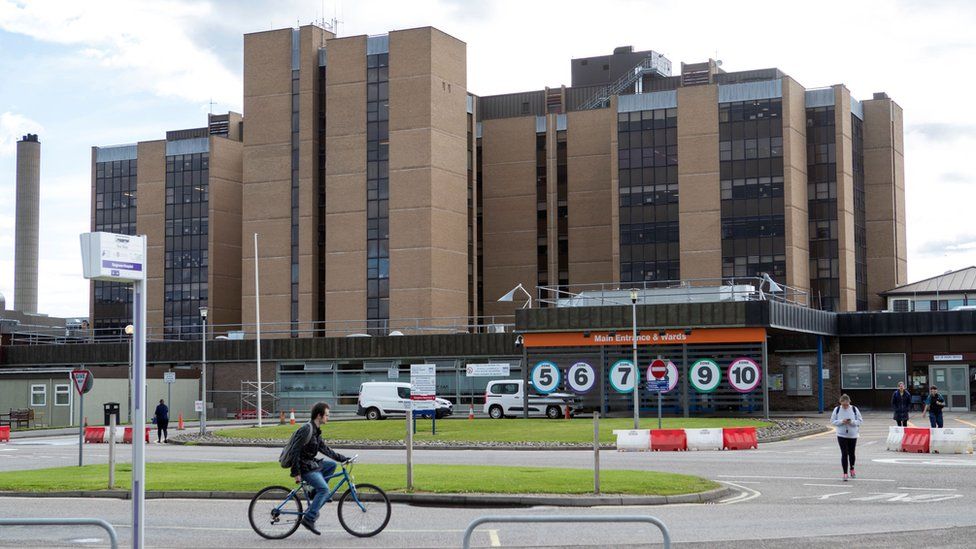
A refurbishment of the maternity ward at Raigmore Hospital in Inverness is one of the projects on hold
By Andrew Picken
BBC Scotland News
Plans to build new hospitals, surgeries and a network of treatment centres in Scotland have been put on hold.
At least a dozen NHS construction projects across Scotland have been delayed or paused for up to two years as a result of budget pressures.
Health boards were told by the Scottish government that no money was currently available for the building schemes.
The Scottish government said a revised NHS infrastructure plan would be unveiled in the spring.
In the meantime, addressing essential maintenance issues would be prioritised.
The latest Scottish budget had to address an estimated £1.5bn funding shortfall.
Image source, PA Media
A refurbishment of the maternity ward at Raigmore Hospital in Inverness is one of the projects on hold
The biggest project facing delays is a network of 10 treatment centres across Scotland.
This network is intended to deliver at least 40,000 additional elective surgeries, diagnostics and other procedures per year by 2026.
Last week, Health Secretary Neil Gray said these treatment centres were part of his “overriding mission” to increase capacity in Scotland’s NHS.
But soaring construction costs, material shortages and the impact of meeting tougher ventilation standards have impacted the cost of all recent building projects.
NHS projects paused or facing delays:
- Lothian – New cancer centre and eye hospital in Edinburgh, and a national treatment centre in Livingston.
- Ayrshire & Arran – National treatment centre at Carrick Glen Hospital in Ayr.
- Tayside – National treatment centre at Perth Royal Infirmary.
- Highland – Replacement hospital in Fort William, revamps of Caithness General Hospital and the maternity ward at Raigmore Hospital in Inverness. Relocating two GP practices to Cowal Community Hospital in Dunoon.
- Lanarkshire – Replacement for Monklands Hospital in Airdrie and national treatment centre in Cumbernauld.
- Grampian – National Treatment Centre in Aberdeen, MRI scanner for Dr Gray’s Hospital in Elgin and a refurbishment of the mental health ward at Dr Gray’s.
In recent years, waiting lists for a range of treatments on the NHS have been growing amidst warnings that staffing levels are “dangerously low”.
The Scottish government said NHS staffing was at record levels thanks to its investment, which also included record pay increases last year.
NHS boards were told by Scottish government officials that building work on new projects could be paused for two years as a result of the spending squeeze.
‘It’s like walking in to your granny’s house’
Donald Campbell, chairman of Kincardine Community Council, says the west Fife village desperately needs a new health centre
The 1930s cottage that houses Kincardine Health Centre reached the “end of its economic life” in 2016 when NHS Fife announced plans to build a replacement.
“The outside has had a lick of paint but the inside has not,” says Donald Campbell, chairman of the Fife village’s community council.
“It is like walking in to your granny’s house, but it’s been condemned and is just not fit for purpose.”
One of the challenges for patients is dealing with the practice’s single phone line to book appointments.
But they also have to regularly travel outside of the village for services, such as physiotherapy sessions, which modern health centres do on site.
Advanced plans to build a replacement health centre in a nearby park have now been paused.
Image source, NHS Fife
What the Kincardine Medical Centre should look like when construction is complete
NHS Fife was told by Scottish ministers that the money was now unlikely to be made available until 2026 at the earliest.
“How can you say you can’t have a new health centre when it has been condemned? It is a ridiculous state of affairs,” Donald said.
While construction of the new medical centre is on hold, elsewhere in the village of about 3,000 people, there are plans to build hundreds of new homes.
Donald says this “simply does not compute” with having such a small medical facility.
Dr Iain Kennedy, chair of BMA Scotland, told the BBC’s Good Morning Scotland programme the delays did not come as a surprise.
He said: “We have been saying for some time that the NHS in Scotland does not have he resources to be sustainable in the future.”
Dr Kennedy added too many hospitals were “getting a bit crumbly” and warned waiting lists were only going to get longer.
Asked if radical reform was needed he told the programme the health service should be “free at the point of delivery” but needed to modernise.
Dr Kennedy said: “We can’t have a free buffet for all, where it is an all you can eat buffet.
“We definitely need to prioritise and say what we will provide and what we won’t provide.”
A Scottish government spokeswoman described the capital funding position as “extremely challenging”.
She added: “The UK government did not inflation-proof its capital budget which has resulted in nearly a 10% real-terms cut in the Scottish government’s capital funding over the medium-term between 2023-24 and 2027-28.
“Our emphasis for the immediate future will be on addressing backlog maintenance and essential equipment replacement.
“As a result of the cut in our capital budget, a revised infrastructure investment plan will be published in the spring and all due consideration will be given to what projects can be included within that revised plan.”








